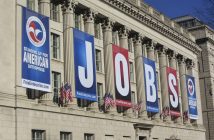USnews.com recently featured a report titled “Immigration and Economics: By the Numbers.” The article is chock full of gushing praise for immigrant entrepreneurs, claiming that they “enhance productivity and create jobs for Americans and visa-holders alike.” And it cites a study commissioned by Carbonite, a Boston-area software company founded by former IBM executive, and Guyanese immigrant, Mohammed Ali. That study found “that 40 percent of Fortune 500 companies were founded by immigrants or the children of immigrants. And more than half of U.S. startups valued at $1 billion or more…were started by immigrants.”
But, like most mainstream media reporting on the costs of immigration, the U.S. News piece has it all backwards. Most companies aren’t started by a single individual. So it is more than likely that nearly all of the cited businesses would have gotten off the ground and flourished, even without the immigrant who happened to be part of the founding group. More importantly, however, immigrants don’t drive the U.S. economy. America’s enormous, flexible, and resilient economy drives immigration to the United States.
People fleeing civil strife see economic freedom as the ultimate protection against oppression. Individuals who immigrate to the U.S. seeking better life often find that building a business gives them control over their economic destiny in a way that was impossible in their old country. And foreign entrepreneurs don’t immigrate to countries with onerous requirements for starting up businesses. Instead they go where they can make the most of their talent and capital.
That’s why the U.S. has always had a large number of immigrants in the ranks of its successful business people. But that is a measure of how good the United States is for immigrants with business aspirations. It is not necessarily a measure of how good immigration is for the United States.
For every immigrant who becomes a millionaire, there are hundreds more with minimal education, trapped in low-wage jobs, dependent on government assistance in order to live at a subsistence level. The average illegal alien household takes in roughly $14,387 more in benefits than it pays out in taxes. Lawfully present aliens in low-skill/low-wage jobs may receive even more in taxpayer-funded benefits – since they can legally apply for government assistance.
Meanwhile, of the millions of immigrants lawfully admitted to this country each year only seven percent are sponsored by U.S. employers. Fewer than one percent enter under programs set up to attract highly skilled workers and already established business people to the U.S. The remainder are admitted because of family ties to earlier immigrants who are likely to be living at, or near, the poverty line. This has been true for decades.
U.S. News may be able to demonstrate that some immigrants have been unusually successful in the United States. What it can’t prove is that those few immigrants who have reached the upper echelons of wealth are in any way offsetting the costs of millions of immigrants whose main source of income is the American taxpayer. Showing that individual foreigners have made positive contributions to our economy is a long way from conclusively demonstrating that uncontrolled mass migration is a good long-term policy for the United States.





11 Comments
4
Matt immigration is so complex for instance most F1 student visas that eventually become part of our industry are above average citizens and mostly higher in education and financially than most average Americans when hey come here……..a fact most do not even know…..
n the best from their country….there you have it..part of the reason we became a power…..another along the lines example Trump an family…anything else to say?
n of course the worst…. the criminals that kill people and are not getting caught….I see only human beings……
Pingback: Must Know Headlines – ExposeTheMedia.com
An Atlantic Monthly article that shows that most economists’ thinking that an increased influx of immigrants provides more jobs for Americans is FALSE and does harm jobs for US workers and the economy:
http://www.theatlantic.com/business/archive/2015/01/does-immigration-harm-working-americans/384060/
http://query.nytimes.com/gst/fullpage.html?res=990DEFDC1430F934A15750C0A9609C8B63
http://krugman.blogs.nytimes.com/2006/03/27/notes-on-immigration/
The Conscience Of A Liberal–Paul Krugman
“First, the benefits of immigration to the population already here are small.”
” But as Mr. Hanson explains in his paper, reasonable calculations suggest that we’re talking about very small numbers, perhaps as little as 0.1 percent of GDP.
“My second negative point is that immigration reduces the wages of domestic workers who compete with immigrants. That’s just supply and demand…
“Finally, the fiscal burden of low-wage immigrants is also pretty clear. ”
Also, it is patently untrue that “immigrants” are the solution to low rate of start-ups:
http://smallbiztrends.com/2015/01/immigration-reform-declining-start-rate.html
Are you sure your links are true? Did you do the work yourself? Perhaps Best you have your in blog…..your feed back tends to make this blog cloudy n inefficient
Boy Honda ? Your ancestors did the same…..
Very simple, Steve Jobs son of an immigrant…. Trump son of immigrants…the first lady an immigrant…..etc etc etc
Pingback: The Economic "Benefits" of Immigration: Importing A Haystack To Find a Needle - The Immigration Post
真是学无止境!
学无止境Xué wú zhǐjìng
See also
无, 学, 止, 境, 止境
?????????????????????????
Learn there languages….!!!